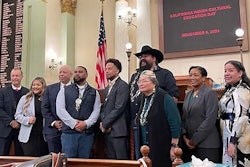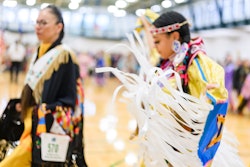TUCSON, Ariz.
Students representing American Indian tribes across Arizona are gaining real-world business experience they can apply toward starting their own enterprises at the Native American Youth Entrepreneur Camp, this week at the University of Arizona, the university announced.
The camp, held Sunday to Saturday, July 20 to July 25, recruits students from Arizona’s 21 tribes. Geared towards high school juniors, seniors and recent graduates, the camp teaches its participants the basics of economics, computer skills and business plan preparation.
UA officials said the camp was created by Joan Temeche while she worked as the director for the Center for American Indian Economic Development at Northern Arizona University. She brought the program with her when she accepted the assistant director position at the UA’s Native Nations Institute in 2001.
“The idea behind the weeklong camp is to plant a seed that these kids can do it for themselves, said Timeche.. “If they have a dream of owning a restaurant; we teach them to start small scale – after school, in the summer and on the weekends – with a small business like selling burritos with their family on the reservation. We teach them about economics, pricing, marketing, reinvestment and presentation both of their product and themselves.”
A $650 tuition fee covers housing, meals, session materials, instruction and extracurricular fees and many who attend are sponsored with scholarships paid for by reservation youth councils, school business clubs, tribal enterprises and local businesses.
During the camp, the students were given the opportunity to meet and seek advice from American Indian businesspeople. This year’s guest speaker – Carlene Hunter, the founder and principal owner of Lakota Express, a direct marketing business, shared her experience with the students. Hunter, a Lakota tribal member, built Lakota Express from a corner in her basement; today it is one of the largest nongovernment employers on the Pine Ridge Reservation.
On day four of the camp, the young entrepreneurs participate in an event called Youth Marketplace Day, where they are given the opportunity to run their own businesses. They are issued $10 in venture capital funds to purchase a wholesale inventory item and then resell the item on the Pascua Yaqui Reservation.
The camp ends with a Business Plan Showcase, where students present their business plans and are awarded venture capital from $25 to $100 for the most promising ideas.
Timeche said her goal of improving economic conditions on the Indian reservations blended well with the Native Nations Institute’s mission to support the self-governance of Indian nations.
. “Only a few brave first-generation American Indian business owners realized that establishing a tribal member-owned business would create jobs and improve the standard of living while keeping dollars circulating on the reservation,” Timeche added. “I believe that exposing our Native youth to the world of entrepreneurship will help to expand the private sector and improve economic conditions on reservations in the future.”
© Copyright 2005 by DiverseEducation.com


















